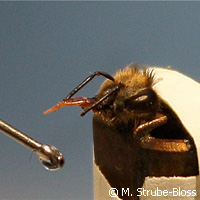Sweet memory of nectar, heady scent of success
If you are training to be a successful, productive honeybee, you will need to learn how to sniff out a promising flower at a distance. Your career will keep you too busy to waste precious flight time on duds. Time, in short, is nectar - and luckily, as a bee, you are equipped to handle a steep learning curve. Scientists in Germany have analysed how bees pick up the skill, and have traced odour memory to a specific part of their brains. Scientists at Freie Universität (FU) Berlin and the Bernstein Center for Computational Neuroscience, Berlin, headed up by Professor Randolf Menzel at FU Berlin's Department of Biology, Chemistry and Pharmacology, were involved in the research. The team 'investigated how and whether bees can recognize a relationship between the odour and nectar of a [sic] particular flowers and whether this association is localised in a certain area of the bee brain', says FU Berlin, presenting the team's findings. To do so, the researchers set up a 'bee school' in their lab. Honeybees were introduced to five artificial fragrances. From then on, the presentation of one of these odours was always followed by the appearance of a drop of sugar solution, whereas the other fragrances went unrewarded. The conditioning worked. As their antennae came into contact with the tasty liquid, the bees learned to make the connection, subsequently extending their probosces to collect their prize at the first waft of the promising scent. This response was maintained a full three hours after learning. Dr Martin Strube-Bloss, who has now moved on from FU Berlin to the Max Planck Institute for Chemical Ecology, investigated the neural basis of this memory process. He measured the electrical reactions of the output neurons in the mushroom bodies of the bees' brains, which had already been identified as likely to play a role. 'Mushroom bodies in the insect brain are higher-order structures involved in integration of olfactory, visual, and mechanosensory information and in memory formation,' the researchers explain. 'The result was surprising,' comments FU Berlin. 'During the learning phase, the activities in the neurons did not change at all. But three hours after learning, there was a change: more neurons responded to the rewarded stimulus, and the responses to the rewarded stimulus were stronger. So the researchers had actually found a memory trace. Because of its time delay, they could even conclude that it was not due to the learning process itself or to short-term memory, but that they had rather identified the seat of long-term odour memory.' Mathematical analysis, performed by Dr Martin Newrot at FU Berlin, demonstrated the reliability of the response. Observing the output neurons of the mushroom body when one of the five fragrances was presented, the researchers were able to tell if it was a rewarded scent. The neural processing involved in deciding if the odour was promising took a mere 150 milliseconds. These insights, recently published in the Journal of Neurosciences, are now feeding into the development of a computer model of the bee brain. This model will be designed to associate virtual odours with rewards, and to make decisions based on these associations - a new step ahead for the development of artificial brains for biomimetic robots.For more information, please visit: Freie Universität Berlin; Department of Biology, Chemistry and Pharmacy: http://www.bcp.fu-berlin.de/en/index.html and http://www.biologie.fu-berlin.de/neuroinformatik Bernstein Network Computational Neuroscience: http://www.nncn.de Journal of Neurosciences: http://www.jneurosci.org/
Countries
Germany



